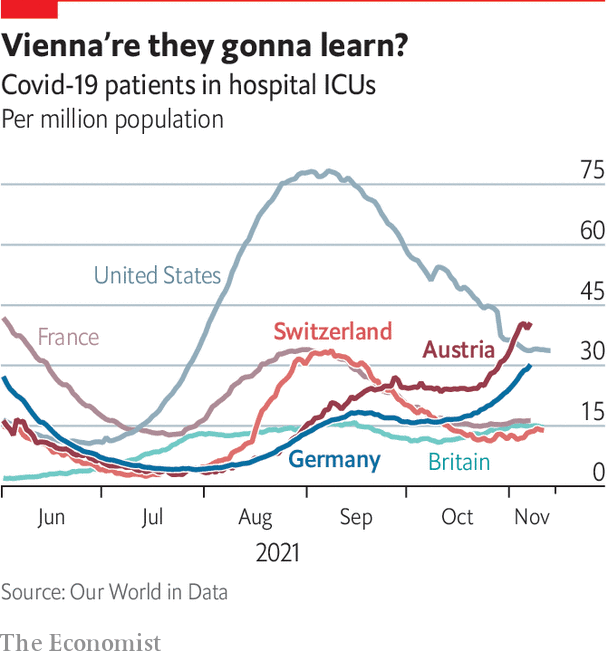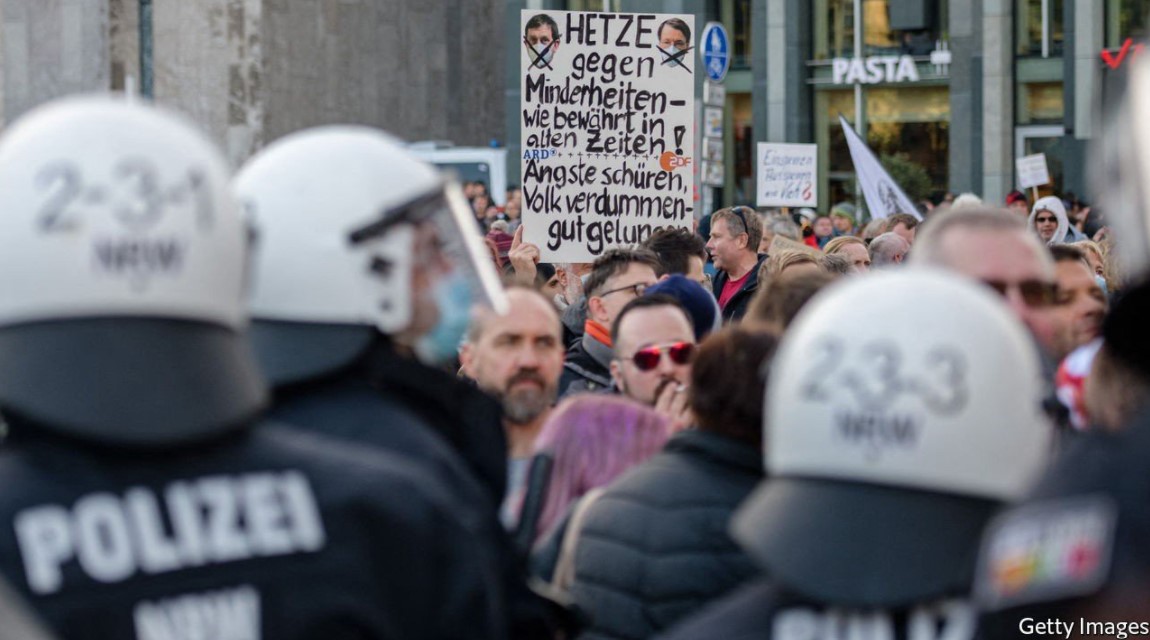The latest wave of covid-19 is harrowing German-speaking countries
The Economist
November 15, 2021
Berlin
This is a republication of the article “The latest wave of covid-19 is harrowing German-speaking countries”, focusing on the question on the top.
“IT IS TERRIFYING, all the arguments and measures to persuade the unvaccinated to get the jab are simply ignored,” said Manfred Güllner, head of Forsa, a German pollster. The cause of his consternation?
In a recent Forsa survey, 65% of the 3,048 unvaccinated Germans polled said they would “definitely” not get a covid-19 jab in the next two months. A further 23% were inclined not to.
In a recent … survey, 65% of the 3,048 unvaccinated Germans polled said they would “definitely” not get a covid-19 jab in the next two months. A further 23% were inclined not to.
Germany, Austria and Switzerland have the highest shares of unvaccinated people in western Europe, bar tiny Liechtenstein and Luxembourg.
Most of their hold-outs vote for populist, far-right parties.
In Germany, for example, around 50% of those polled by Forsa voted for the AfD, a far-right party particularly popular in the east;
- 15% cast their vote either for Die Basis, the political arm of the Querdenker, the movement opposing all measures to contain the covid-19 pandemic (the picture shows a Querdenker rally).
- Saxony, the eastern state where the AfD is strongest, has Germany’s lowest vaccination rate, just 57.5%, and its highest infection rate.

Because more than two-thirds of the population are fully vaccinated, the latest wave is far less deadly than it might have been.
Deaths are rising far more slowly than infections.
Yet intensive-care wards are again close to capacity in particular in Austria and Germany (see chart). At the same time the political gulf between the vaccinated and the unvaccinated is widening.
New measures in Austria and Germany to halt the spread of infection are aimed at cajoling the unvaccinated into getting jabbed without inflicting another winter of lockdowns on the vaccinated majority.
“A federation of imbeciles has ensured that Germany is being hit extremely hard by the fourth wave-much worse than many other European countries,” says Der Spiegel, a weekly, in its current edition.
- On November 11th Germany reported 50,196 new cases, the second-highest number in the world after America.
- On November 15th the number of new cases per 100,000 people in the previous seven days hit 303, the highest rate yet recorded.
- In Saxony it is 754 and in some eastern and southern districts it exceeds 1,000.
The government is reportedly preparing to bring in the army to assist stretched health-care services.
The government is reportedly preparing to bring in the army to assist stretched health-care services.
The city of Berlin on November 15th banned the unvaccinated from restaurants, bars, cinemas, theatres, concert halls and other entertainment sites, in an expansion of the capital’s “2G” ( geimpft or genesen -vaccinated or recovered) rule.
In some places even the vaccinated or immune must be tested before entry.
Outdoor events with more than 2,000 people are also off-limits for the unjabbed.
As caseloads have risen, it has not helped that Germany has been virtually leaderless since elections at the end of September.
Angela Merkel, the departing chancellor, Olaf Scholz, her likely successor, and all 16 state premiers will at last meet on November 18th to discuss new measures to contain the pandemic.
Most expect something like the imposition of Berlin’s 2G rule to the entire country, but no new lockdown.
Germany’s “state of epidemic emergency”, which permits the government to impose a national lockdown or close schools, expires on November 25th-and the likely incoming government coalition of Social Democrats, Greens and Free Democrats under Mr Scholz does not want to renew it. (Mrs Merkel’s Christian Democrats are campaigning for renewal.)
Austria
In neighbouring Austria the situation is even grimmer.
The seven-day infection rate is more than 800 per 100,000 people, and hospitals are cancelling non-emergency surgery.
Though the government intended to wait until 600 beds in intensive-care wards were occupied by covid-19 patients, it has acted before reaching that alarming milestone.
From November 15th it has imposed a ten-day lockdown on unvaccinated people aged 12 or over.
Those who cannot prove that they are either fully vaccinated or immune through recovery from a past infection may leave their home only for essential reasons, such as going to work or to buy groceries-or to get a jab.
People breaking the rules face fines starting at about €500 ($572); businesses will have to pay €3,000. Groups conspiring to evade regulations could be clobbered for €30,000.
“We must raise the vaccination rate. It is shamefully low,” said Alexander Schallenberg, the chancellor, on November 14th. Roughly 65% of Austria’s population are fully vaccinated.
People breaking the rules face fines starting at about €500 ($572); businesses will have to pay €3,000. Groups conspiring to evade regulations could be clobbered for €30,000.
The right-wing Freedom Party, which gets around a fifth of votes at national elections, is the mouthpiece of anti-vaxxers.
Herbert Kickl, the party’s boss, rails against Austria’s “covid-apartheid”.
He is calling for a demonstration in Vienna against the new measures on November 20th and is threatening to sue the government at the Constitutional Court.
Switzerland
Across the border in Switzerland citizens will vote in a referendum on November 28th on codifying the federal government’s emergency pandemic powers.
Opponents are especially vocal in German-speaking cantons; Freiheitstrychler, who describe themselves as the original Swiss, are particularly prominent. (Freiheit means “freedom”; they carry trycheln, the giant cowbells that are a folkloric Swiss symbol.)
The referendum particularly concerns the Swiss covid certificate, which has been compulsory since September 13th for admission to restaurants, gyms, cinemas, and big cultural and sports events.
The populist Swiss People’s Party (SVP), the country’s strongest, is campaigning against the emergency powers.
According to a recent poll 51% of its supporters are unvaccinated.
The Swiss government (a seven-strong council on which the SVP occupies two seats) last week launched an unprecedented vaccination drive with mobile inoculation centres, a vaccination “village” at the main railway station in Zurich and in-person or telephone counselling.
Only 65% of the population are fully vaccinated.
The government is unlikely to win the Trychler over. But it hopes to persuade some reluctant Swiss that getting jabbed is a price worth paying to visit their local restaurant for rösti.
Originally published at https://www.economist.com on November 15, 2021.
TAGS: Vaccines roll out issues; Vaccines resistancy; Europe; German speaking countries;












